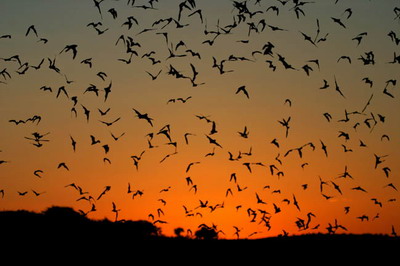
Most people think they’re creepy, but flying mammals are quite beneficial. Recent federal research shows how big an impact the Mexican free-tailed bats, the most commom bat found in the southern U.S., have on farms, agriculture and life in the state of Texas. These bug-eaters save farmers millions of dollars in avoided pesticide costs and better crop yields, the study shows.
Over the past four years, researchers from as far as Tennessee and Massachusetts have descended on South Texas in an “agro-bat” project to flesh out just how much the bats protect corn, cotton and other crops against insect infestation.
A 2006 article in the journal Frontiers in Ecology and the Environment, written by the team, reported that bats save farmers and the state nearly $1.7 million in insect pest suppression for cotton production in a portion of Texas’ south plains.
The researchers, entering the final year of their $2.4 million federally funded study, say even urban bat communities help rid farms of pests. The 1.5 million Congress Avenue bats in Austin travel as much as 125 miles a night for their prey, said John Westbrook, a research meteorologist at the U.S. Department of Agriculture agricultural research station at College Station.
Each night the bats consume as much as 20,000 pounds of insects, according to Austin-based Bat Conservation International.
Although the bats do eat mosquitoes, a larger portion of their diet comes from the corn earworm and the tobacco budworm, both essentially moths that cost farmers about $1 billion per year nationally in pesticide use and yield losses due to crop damage, according to researchers.
“They’re a farmer’s friend,” said Patricia Morton, a bat biologist at the state Parks and Wildlife Department.
In September, the Parks and Wildlife Department will publish and distribute to schools about 20,000 copies of “Frankie the Free-tailed Bat,” a children’s book about a year in the life of a female bat who migrates to Texas, where she has a pup.